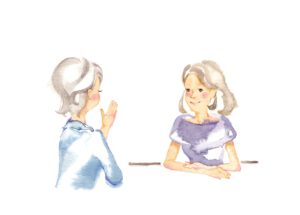Helping Others Who Are Coping with Loss of a Loved One
©Nancy Wyatt January 2017 All Rights Reserved
 I am a Holistic Healer and was a long-term volunteer in a shelter for homeless people, who suffered from AIDS, addictions, diabetes, and many other ailments (including broken hearts). In my life and in those roles, I have been privileged to provide company and assistance to both humans and animals as they made their transition to the next realm.
I am a Holistic Healer and was a long-term volunteer in a shelter for homeless people, who suffered from AIDS, addictions, diabetes, and many other ailments (including broken hearts). In my life and in those roles, I have been privileged to provide company and assistance to both humans and animals as they made their transition to the next realm.
Almost everyone I know has suffered life-changing loss and bereavement, whether that relates to health, a career, or a loved-one. I love being able to help people in those circumstances. In addition, I recently taught a series of classes on physical and spiritual ways to recover from deeply-felt loss…usually related to the death of a family member. So, I was interested in an article by Heather Plett, a Canadian, who wrote about 13 Sensitive Ways to Help Someone in Mourning.
Heather’s article was originally published in the Winnipeg Free Press. I have not met Heather, but she has done some fascinating things in the world and further describes herself as a writer, workshop presenter, and a person who “holds space for people’s growth, grief, healing, learning, and transformation.” I hope you check her out.
Helping Others Who Are Coping with Loss by LISTENING
 One of the main points we make is to LISTEN to the person who is feeling bereaved. Less talk. More listening. Both you and they may be surprised at the thoughts and feelings being expressed, if the “listener” can avoid projecting his or her expectations about what should be said. Free and uninterrupted expression can be very cathartic (healing) for the person who is suffering great loss. Take time. Don’t try to fill awkward pauses of silence. Let the feelings and thoughts emerge. Do not judge them. Allow free expression and silences.
One of the main points we make is to LISTEN to the person who is feeling bereaved. Less talk. More listening. Both you and they may be surprised at the thoughts and feelings being expressed, if the “listener” can avoid projecting his or her expectations about what should be said. Free and uninterrupted expression can be very cathartic (healing) for the person who is suffering great loss. Take time. Don’t try to fill awkward pauses of silence. Let the feelings and thoughts emerge. Do not judge them. Allow free expression and silences.
I won’t list all of Heather’s ideas because I want you to read them for yourself on her site. However, many of the things Heather lists in “How You Can Help the Bereaved During Their Worst Moments” are things I already know from experience, like:
Helping Others Who Are Coping with Loss
by Showing Up and Continuing to Show Up.
After funerals and memorial services, the bereaved must return to their lives and face changed conditions. Often, they must assume responsibilities they never had before (like earning an income or paying bills). Sometimes, a spouse handled car repairs, household and property maintenance, taking animals to a vet, managing investments, etc., and the person who remains does not even know where to start. These things may seem small to people who are accustomed to doing them; but, they can feel overwhelming to a novice, no matter what age or level of maturity they have attained.
 In addition, of course, when one is used to living with companionship, the feeling of an “empty house” can be devastating for months or years, so keep in touch and help the person stay connected. You might do this in person by bringing them a smoothie or inviting them to haver dessert – your house or theirs. Later, you can help them rejoin a larger world by inviting them out to dinner and a concert. You also can initiate periodic contacts through social media, gifts, and note cards. Just ensure you are keeping their wishes, personalities, and interests in mind. In other words, customize your messages and interactions to fit the person they are – not just the person you are.
In addition, of course, when one is used to living with companionship, the feeling of an “empty house” can be devastating for months or years, so keep in touch and help the person stay connected. You might do this in person by bringing them a smoothie or inviting them to haver dessert – your house or theirs. Later, you can help them rejoin a larger world by inviting them out to dinner and a concert. You also can initiate periodic contacts through social media, gifts, and note cards. Just ensure you are keeping their wishes, personalities, and interests in mind. In other words, customize your messages and interactions to fit the person they are – not just the person you are.
Helping Others Who Are Coping with Loss
by Finding A Need and Filling It
 I loved Heather’s advice: “Try not to ask “how can I help”, because the family has so much on their mind they probably won’t have an easy answer – Just find something to do and do it.”
I loved Heather’s advice: “Try not to ask “how can I help”, because the family has so much on their mind they probably won’t have an easy answer – Just find something to do and do it.”
I would add some suggestions here.
- Buy them a tank of gas.
- Offer to do the laundry.
- Offer to mow the grass.
- Babysit.
- Feed and/or walk the animals daily for a week or more.
- Arrange for a person to clean their house on a mutually agreed-upon day.
- Offer to pick up prescriptions, dry cleaning, guests – or whatever else might need to be picked up.
- Give a gift certificate for a massage, Reiki, or other healing session.
- Give a meditation CD or link to one on-line.
- Teach them how to do things they must do when you know how and they are receptive.
- Help them with a resume or job references and suggestions.
- Help them make lists of things to do and/or see which items you can do for them.
- When the time comes, help them dispose of items for donation
- Help them ready the house and property for selling, or help them move to new quarters.
- Provide financial assistance if you are able and it is appropriate.
Here is one of Heather’s most important suggestions:
Helping People Who Are Coping with Loss by
Remembering the Children
 Heather said, “Some people were very good at knowing what our young children would need and when. The night of the viewing, friends showed up with colouring books and crafts to keep the children entertained while we mourned. Children can feel very lost, confused and overlooked when the adults closest to them are emotionally distraught. If there are children involved, offer to take them to the park or some other neutral/enjoyable place for awhile. Taking them away, even for a short period of time, gives them a break from the emotional atmosphere and gives their parents a much-needed break.” Great advice.
Heather said, “Some people were very good at knowing what our young children would need and when. The night of the viewing, friends showed up with colouring books and crafts to keep the children entertained while we mourned. Children can feel very lost, confused and overlooked when the adults closest to them are emotionally distraught. If there are children involved, offer to take them to the park or some other neutral/enjoyable place for awhile. Taking them away, even for a short period of time, gives them a break from the emotional atmosphere and gives their parents a much-needed break.” Great advice.
I hope these ideas are helpful to you. For more information, a class, or a counseling session, please contact me to schedule.
Let’s Get Well, Stay Well, and Live Well Together!
